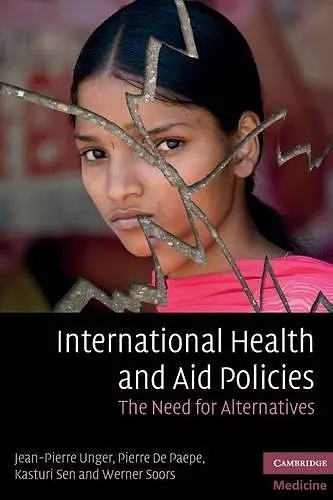International Health and Aid Policies
The Need for Alternatives
Kasturi Sen author Jean-Pierre Unger author Pierre De Paepe author Werner Soors author
Format:Paperback
Publisher:Cambridge University Press
Published:23rd Sep '10
Currently unavailable, and unfortunately no date known when it will be back

Using international case studies to critique recent health and aid policies, this book presents strategies to create fairer health services.
Based around a series of international case studies, this book illustrates how recent health and aid policies have often failed in their aims. It offers strategies for health care professionals to campaign for quality, discretionary health care systems, accessible to all.International health and aid policies of the past two decades have had a major impact on the delivery of care in low and middle-income countries. This book argues that these policies have often failed to achieve their main aims, and have in fact contributed to restricted access to family medicine and hospital care. Presenting detailed evidence, and illustrated by case studies, this book describes how international health policies to date have largely resulted in expensive health care for the rich, and disjointed and ineffective services for the poor. As a result, large segments of the population world-wide continue to suffer from unnecessary casualties, pain and impoverishment. International Health and Aid Policies arms health professionals, researchers and policy makers with strategies that will enable them to bridge the gaps between public health, medicine and health policy in order to support robust, comprehensive and accessible health care systems in any political environment.
'International Health and Aid Policies: The Need for Alternatives represents an important and comprehensive effort in gathering the evidence of the grave consequences on developing countries' health systems of some international health and aid policies that promote excessive reliance on disease specific programs and commercialised care. The book proposes alternative policy scenarios … and highlights the key role of health system researchers in influencing the development of pro-equity international health policies and the evaluation of their impact. The thorough review of historic data and trend analysis will serve scholars and decision makers alike.' Mirta Roses, Pan American Health Organization, Regional Office of the World Health Organization
'Timing is everything in comedy and in scholarship. One cannot imagine a better timing for this book's publication. The title of the book promises to make a call for health services with a clear social mission; and this it fully delivers. Here is a book that paves the way in a direction using the right political analyses. It tells us that it has been donors who have pushed the patterns of commercialisation of health in poor countries; and that aid policies share a large responsibility for the breakdown of the health systems of many of the poor countries we currently see. It highlights the contradictions of public provision under the guise of commercialised health care looking at two decades of neoliberal policy that has systematically undermined access to quality health care services for a majority of the world population. This, it rightly claims, receives far too little attention in the literature. The book is clear about the need for a policy shift that re-establishes the right to access to quality healthcare. It proposes a health policy based on a political philosophy in an attempt to reconcile professional, cultural and political ethics. It clearly states that health policy is political in the sense that it refers to actions (deeds) meant to challenge the structures of power and social organisation from an ethical perspective. For all these reasons, the People's Health Movement feels the principles of its People's Charter for Health are here represented; our worldwide membership would want to read it.' Bridget Lloyd, People's Health Movement Co-ordinating Commission
'This important book challenges the dominant discourse on global health and the growing commoditization of health care to the detriment of poor people all over the world. The serious and evidence-based questions and facts raised by the authors on the relentless promotion of private sector growth in health must now be answered.' Anna Marriott, Development Finance and Public Services Team, Oxfam GB
'This book comes at a time of a highly needed reform in the Global Health Governance and the International Health Aid Architecture. The attention to health has been enhanced in global fora and health aid has tripled in the last decade. We all share responsibility and the challenge to address the highly fragmented health landscape. The EU is developing a new policy framework aimed at greater equity and coherence in the EU role in Global Health. The agreed global commitment to universal coverage rescuing the Alma-Ata principles and applying the principles of partnership and ownership to health in development aid, are clear opportunities. The reflections of this book will be a valuable reference for our debate and the enhanced EU role in the global health challenges.' Juan Garay, Public Health Physician, Health Team coordinator, DG Development, European Commission
ISBN: 9780521174268
Dimensions: 234mm x 157mm x 15mm
Weight: 540g
314 pages